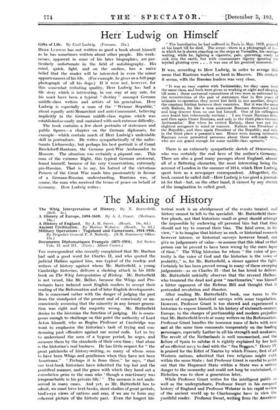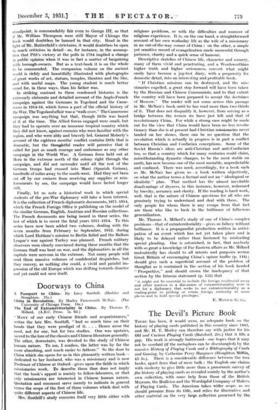The Making of History
The Whig Interpretation of History. By N. Butterfield. (Bell. 4s.) By Brigadier General F. J. Moberly. (H.M. Stationery Office.
15s.) Documents Diplomatiques Francais (1871-1914). 3rd Series.
Vols. II. and III. : Alfred Coster.) THE correspondent who recently complained that Mr. Buchan had said a good word for Charles II, and who quoted the judicial Hallam against him, was typical of the reader and writers of history against whom Mr. Butterfield, a young Cambridge historian, delivers a slashing attack in his little book on The Whig Interpretation of History. Mr. Butterfield is not vexed, like Mr. Belloc, because the Whigs and Pro- testants have induced most English readers to accept their reading of the 'Reformation and of later English developments. He is concerned rather with the danger of judging- the past from the standpoint of the present and of consciously or un- consciously assuming that the minority in any former genera- tion was right and the majority wrong. Mr. -Butterfield denies to the historian the function of judging. He is coura- geous enough to challenge on this point the authority of Lord Acton himself, who as Regius Professor at Cambridge was wont to emphasize the historian's task of trying and con- demning past offenders against our moral code. Let us try to understand the men of a bygone period, he urges, and measure them by the standards of their own time ; that alone is the historian's real business. He has little respect for " the great patriarchs of' history-writing, so many of whom seem to have been Whigs and gentlemen when they have not been Americans." " Perhaps it is from these," he says, " that our text-book historians have inherited the top hat and the pontifical manner, and the grace with which they hand out a consolation prize to the man who ` though a reactionary was irreproachable in his private life.' " The sarcasm* is not unde- served in many cases. And yet, as Mr. Butterfield has to admit, we must have text-books, -short studies of great periods, bird's-eye views of nations and. eras, if we are to form any coherent picture of the' historic past. • Even the longest his- torical work is an abridgement of the events treated, and history cannot be left to the specialist. Mr. Butterfield-there- fore pleads, not that historians small or great should attempt the impossible by eschewing all personal bias but that they Should not try to conceal their bias. The fatal error, in his view, " is to imagine that history'as such, or historical research however intense, or historical "surveys however broad, can gig a us judgements of value—to assume that this -ideal or that person can be proved to have been wrong by the mere lapse of time." The Whig historian for whom " the voice of pos- terity is the voice of God and the historian is the voice of posterity," is, for Mr. Butterfield, a sinner against the light. Certainly he has been proved wrong in many of these sweeping judgements—as on Charles II—that he has loved to deliver. Mr. Butterfield unkindly observes that the revered Hallam, who trounced the dead and gone " reactionaries," was himself a bitter opponent of the Reform Bill and thought that it portended revolution and disaster.
After reading Mr. Butterfield's book, one turns to the newest of compact historical surveys with. some' trepidation. However, Professor Grant is too shrewd 'and experienced a historian to expose himself, in his history of-sixteenth-century Europe, to the charges of partizanship and modern prejudice that Mr. Butterfield levels at many writers on the Reformation. Professor Grant handles the immense mass of facts with ease and at the same time comments temperately' on the-leading personages, especially Luther-in all his strength and: weakness. The revolt of the Netherlands is well summarized, -and the hilure of Spain to subdue-it is rightly explained by her lack Of an efficient navy to deal with the " Sea Beggars." Henry IV is praised- for the Edict of Nantes by which 'France,. first of all Western nations, admitted that two religions might exist within the same State ; but ProfesSor Grant is careful-to point out that the -Huguenot State within a State was a serious danger to the monarchy and could not long be maintained, cs
Richelieu was to show a generation later. . .
While Professor Grant writes for the intelligent public as well as the undergraduate, Professor- Sweet in his • compact history of England and Professor Webster in -his rapid-review of the ancient world up to' Charlemagne have in view the S-Outhful reader. - Professor Sweets - writing from the American standpoint, is commendably fair even to George HI, so that if Mr. William Thompson were still Mayor of Chicago the book would doubtless be banned in that city. Read in the light of Mr. Butterfield's strictures, it would doubtless be open to much" criticism in detail—as, for instance, in the assump- tion that Pitt's victory at the polls in 1784 implied a change in public opinion' when it was in feet a matter of bargaining with borough-owners. But as a text-book it is on the whole to be commended. The companion volume on the ancient world is richly and beautifully illustrated with photographs of great works of art, statues, temples, theatres and the like, and with useful maps. The young student is much better cared for, in these ways, than, his father was.
In striking contrast to these condensed histories is the extremely elaborate and detailed account of the Anglo-French campaign- against the Germans in Togoland and the Came- roons in 1914-16, which forms a part of the official history of the War. The Togoland affair was a "walk-over." The Cameroons campaign_ was anything but that, though little was heard of it at the time. The Allied forces engaged were small, but they had to operate over an inunense tropical country which they did not know, against enemies who were familiar with the region, and who were ably and bravely led. General Moberly's account of the eighteen months' conflict contains little that is dramatic, but the thoughtful reader will. perceive that it called forjust as much courage and endurance as any other campaign in the World War: A :Gerinan force held out at Mora in the extreme north Of the colony right through the campaikn, and did not surrender until all the rest of the German 'troops had crossed into Muni (Spanish Guinea), hundreits-of Wiles away to the -south-west: Had they not been cut off .by our cruisers from receiving any supplies or rein- forcements by sea, the campaign 'Wotild have lasted longer still.
Finally, let us note a historical work in which special students of the pre-War diplomacy will take a keen interest. It is the collection of French diplomatic documents, 1871-1914, which the French Foreign Office is publishing on the model of the similar German, English, Austrian and Russian collections. The French documents are being. issued in three series, the last of which is to cover the fatal years 1911-1914. To this series have now been added two volumes, dealing with the seven months from February to September, 1912, during which Lord Haldane's mission to Berlin failed and the Balkan League's war against Turkey was planned. French military observers were clearly convinced during these months that the German Staff was bent on war, and the diplomatists in all the capitals were nervous in the extreme. Not many people will read these massive volumes of confidential despatches, but they convey, as nothing else could, a vivid and painful im- pression of the old Europe which was drifting towards disaster and yet could not save itself.











































 Previous page
Previous page